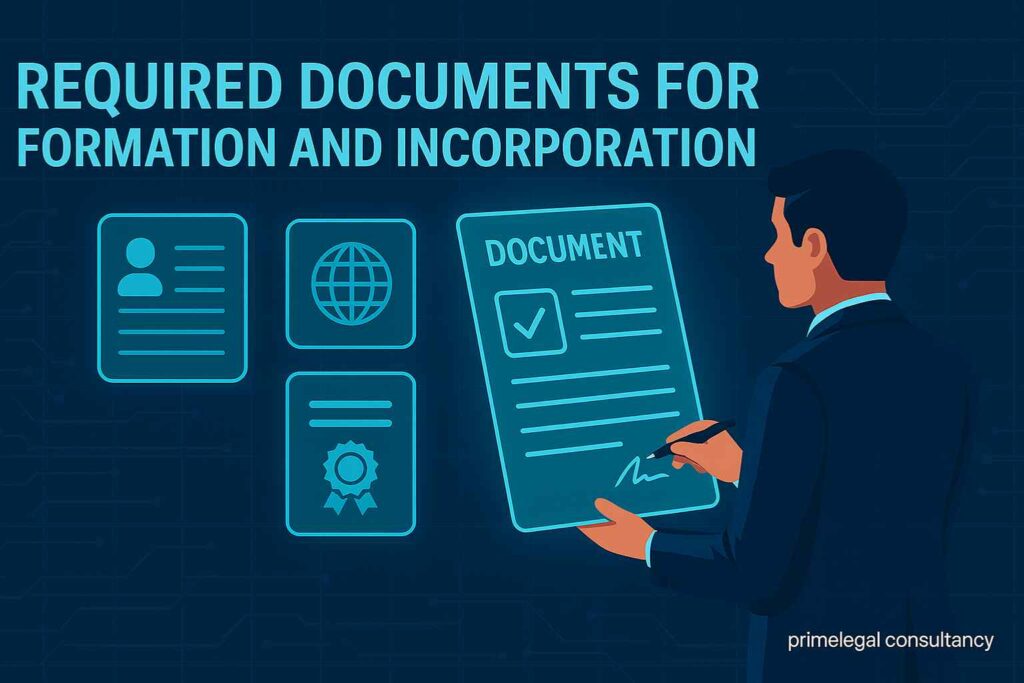Table of Contents
ToggleIntroduction
Launching a business begins with two fundamental steps: formation and incorporation of company. These aren’t just legal formalities; they represent the very structure and identity of a business entity. Whether you’re a solo entrepreneur or setting up a multinational presence, understanding the difference between formation and incorporation is critical to building a compliant and scalable organization.
Across jurisdictions, the process might vary, but the goal remains the same — to establish a company that can operate lawfully, manage liabilities, and pursue growth. Getting it right from the beginning saves time, money, and legal complications down the road. That’s why clarity in this phase is essential for long-term business success.

What is Company Formation?
Company formation refers to the initial process of legally registering a new company with the authorities in a specific country or region. This phase typically includes deciding the company name, choosing a legal structure, and preparing the basic documentation required for setup.
During this step, entrepreneurs also define the company’s nature, such as whether it will be a private limited company, partnership, sole proprietorship, or another legal structure. It’s the beginning of formal recognition and allows the business to start functioning with a clear legal identity.
Understanding Company Incorporation
Incorporation is the next formal step after formation, and it gives the business its own legal personality — separate from its owners. Once incorporated, a company can enter contracts, own property, sue or be sued in its own name. It becomes an independent legal entity.
This phase includes submitting specific documents like the Memorandum and Articles of Association, receiving a certificate of incorporation, and meeting compliance obligations such as appointing directors or issuing shares. Incorporation protects the owners from personal liabilities linked to business debts or legal claims.
Key Differences Between Formation and Incorporation
| Feature | Company Formation | Company Incorporation |
|---|---|---|
| Purpose | Registers the business entity | Grants legal status and recognition |
| Key Activities | Name selection, initial documentation | Filing Articles, issuing shares, directors setup |
| Legal Personality | Not fully established | Fully established as separate legal entity |
| Protection from Liability | Limited | Extensive |
| Required For | All types of business structures | Mainly corporations and LLCs |
This comparison highlights how both steps are interlinked but serve distinct legal and operational functions.

Required Documents for Formation and Incorporation
To complete the process efficiently, it’s important to prepare a specific set of documents:
- Company name approval document
- Business activity approval or licenses
- Memorandum of Association (MOA)
- Articles of Association (AOA)
- Proof of registered address
- Passport copies and identification of shareholders and directors
Depending on the jurisdiction, additional documentation like tax ID applications or bank references may also be required. Ensuring accuracy and completeness in this phase avoids delays and legal complications.
Importance of Choosing the Right Business Structure
Before moving forward with formation or incorporation, selecting the correct structure for your company is vital. The structure affects taxation, compliance, and operational flexibility. For example, a sole proprietorship may suit freelancers, while an LLC is better for startups that plan to scale.
Another consideration is the country of registration. Some jurisdictions offer tax advantages and fewer restrictions, while others prioritize strong regulatory frameworks. Taking legal advice during this step ensures that your structure aligns with your goals and obligations.
Steps Involved in Formation and Incorporation
The procedural steps can slightly vary by country, but here is a general outline:
- Choose a business structure and name that meets local compliance standards.
- Obtain name and activity approvals from regulatory authorities.
- Prepare legal documents like MOA and AOA.
- Register the company with the commercial registrar or corporate affairs body.
- Acquire tax numbers, open corporate bank accounts, and secure necessary licenses.
Each of these steps plays a critical role in establishing a fully operational and compliant business entity.
Benefits of Incorporating a Company
Incorporation unlocks a range of strategic advantages for businesses. First and foremost, it separates personal and business assets. This shields founders from financial risk in case of bankruptcy or litigation. It also helps in attracting investors and raising capital, as incorporated businesses carry more credibility.
In addition to legal protection, incorporation enhances business continuity. The company can continue operating even if ownership or management changes. It builds trust among stakeholders — suppliers, clients, and employees — reinforcing the organization’s reliability and professionalism.
Common Challenges During the Process
Despite the benefits, many entrepreneurs face hurdles during formation and incorporation. Misunderstanding legal jargon, submitting incomplete documents, or selecting the wrong structure can delay progress or result in non-compliance.
Moreover, international incorporation involves dealing with local laws, language barriers, and differing financial systems. Hiring professional consultants or legal advisors can make the process smoother and ensure each step is completed accurately.

The Role of Corporate Service Providers
Business setup consultants and corporate service providers offer invaluable support throughout the process. From name registration to post-incorporation compliance, their guidance saves time and prevents costly errors. These professionals also help maintain annual reporting standards and renew licenses on time.
Outsourcing these services ensures that business owners focus more on operations and strategy rather than administrative tasks. It’s especially helpful for foreign investors unfamiliar with local regulations or language.
Incorporation in Different Jurisdictions
The formation and incorporation requirements vary significantly by region. For example, Singapore and the UAE offer fast, tax-efficient setups with minimal bureaucracy. The UK is known for transparent procedures, while the US offers flexible corporate structures.
Each jurisdiction has its pros and cons in terms of speed, cost, and regulatory expectations. Doing due diligence on country-specific rules and fees is a smart move before deciding where to incorporate.
Also Read: UAE Labour Law Fixed Term Contracts Rules 2025
Conclusion
Building a business begins with two crucial pillars — formation and incorporation. Understanding their distinct roles, legal implications, and procedural steps helps entrepreneurs make strategic decisions from day one. Whether you’re starting locally or expanding internationally, getting these fundamentals right ensures long-term success and legal compliance. With the right support, planning, and awareness, you can set the foundation for a business that thrives and grows in any competitive market.
FAQ About Formation And Incorporation of Company
Q1: Is it formation or incorporation?
Ans: Formation refers to the overall process of starting a company, while incorporation is a legal step that registers the company as a separate legal entity. Both terms are related but not exactly the same.
Q2: What is the formation process of a company?
Ans: The formation process includes choosing a name, drafting documents like MOA and AOA, and registering with relevant authorities. It may vary depending on the country and company type.
Q3: How is a company formed in Pakistan?
Ans: In Pakistan, a company is formed by registering with SECP through the eServices portal. The process includes name reservation, document submission, and fee payment.
Q4: What is the process of formation?
Ans: The process typically includes selecting a business name, preparing incorporation documents, and submitting them to the registrar. After approval, the company receives a certificate of incorporation.
Q5: What documents are required for the process of formation of a company?
Ans: Key documents include the Memorandum of Association (MOA), Articles of Association (AOA), CNIC copies of directors, and address proof. Requirements may vary by jurisdiction.
Q6: What are the rules for formation of a new company?
Ans: Rules depend on local company laws and regulations. In general, companies must follow legal guidelines for naming, ownership, share capital, and registration procedures.
Q7: How is a company incorporated in Pakistan?
Ans: Incorporation in Pakistan is done via the SECP portal by submitting required documents, paying the fee, and getting approval. Once verified, a Certificate of Incorporation is issued.
Q8: How is a public limited company incorporated?
Ans: A public limited company is incorporated by meeting minimum capital and director requirements, filing necessary documents, and registering with the regulatory authority. It may also require listing on the stock exchange.
